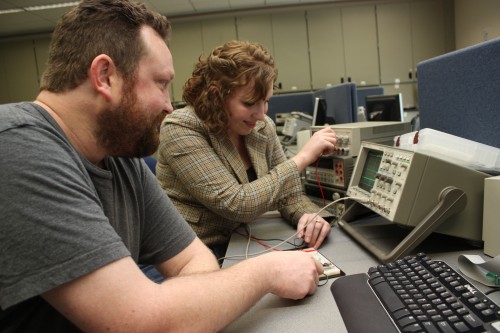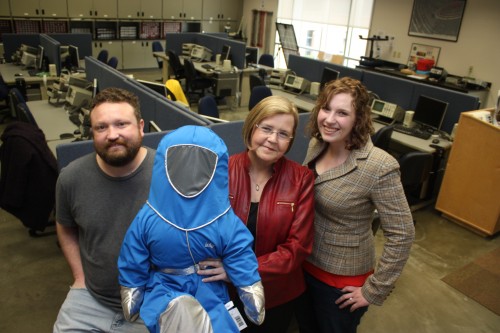This content was published: March 12, 2012. Phone numbers, email addresses, and other information may have changed.
Students find path to job offers from tech giant
Photos and story by James Hill
Hillsboro’s Ben Gold, 34, was a high school dropout 16 years ago. After moving up from California, he worked at a lot of customer service, warehouse and clerical jobs that didn’t excite him. In 2010, he decided he needed to make a change.
“I was tired of going from job to job to job,” Gold said. “I wanted something that will be around for a while and something I can actually retire from. I’ve always been a computer geek and been into computers.”

Ben Gold and Tiffanie Marti excelled in Donna Drayer's MT 180 class that helped them through the job interview process with Intel.
That love of computers led him to earn his GED at the Rock Creek Campus in 2010 and soon after he entered PCC’s Microelectronics Technology Program. During December, in his second year in the program and scheduled to graduate in June, Gold was given a job offer by Intel Corporation to work as a manufacturing technician.
This last November, PCC’s Rock Creek Campus was the site of technical interviews with technology giant Intel Corporation. Joining Gold were more than 40 students on the path to a 2012 graduation in the Microelectronics Technology Program at Rock Creek, and Electronic Engineering Technology and Civil and Mechanical Engineering Technology programs at Sylvania – the first time the latter two were included in an on-campus Intel job interview event for these positions.
Sylvania students grateful at Intel opportunity
The Electronic Engineering Technology and Mechanical Engineering Technology programs also fit the skill requirements Intel needed to staff their new manufacturing plant, said Linda Browning, student resource specialist at the Sylvania Campus. The Sylvania students were given the opportunity to attend an Intel orientation session at their campus and then apply for a position. Students who met the minimum requirements were offered an interview at the Rock Creek event.
“Students expressed their gratitude at being able to interview with Intel before they graduated,” Browning said. “‘Without PCC setting it up, I would not have had the opportunity to work for Intel,’ said one happy student.”
Many of the students from the targeted academic programs at Rock Creek and Sylvania received job offers from Intel.
“The Microelectronics Technology faculty and I are very pleased with the success of the event and the high percentage of potential offers to the students,” said Donna Drayer, Student Employment and Cooperative Education and Internships for PCC. “The students worked very hard to prepare for these challenging technical interviews.”
MT class helps students prepare for interview process
Through a specialized class, Drayer worked with the students to prepare for this special opportunity. One of them was 28-year-old Tiffanie Marti of Beaverton. She had been working with children with autism for a few years and almost finished her bachelor’s degree in psychology in the state of Washington when she decided that career wasn’t what she wanted to do with her life. She had always been good at math and sciences, she said, and when researching possible microelectronics or engineering programs she found PCC’s program in 2010.

This last November, PCC’s Rock Creek Campus was the site of technical interviews with technology giant Intel Corporation.
“The interviews went phenomenal,” Marti said. “I was so nervous. Donna’s class was a really good experience. By the time of the interviews I was so confident. I knew I was going to do a great job and I did. I attribute that to all the work I did in the MT 180 class. The interview would have been difficult if I hadn’t been so prepared.”
Company helped resurrect PCC’s microelectronics program
Intel Corporation is no stranger to PCC. In 1990, at its request, PCC resurrected the Microelectronics Technology Program and updated the curriculum to fit Intel’s wafer fabrication technician requirements. At this time, construction had begun on two new wafer plants at Intel’s nearby Aloha campus and it needed about 300 operators to transition to technician jobs in the new factories. At the start, the program was only for the company’s employees, but was opened up to the public in 1995.
“We needed more technicians to come to work at our factories and since the Rock Creek Campus is right here in our backyard in Washington County we reached out and said ‘Can you help co-design a microelectronics training program and if so we’d like to take as many of your graduates as we can,’” said Jill Eiland, Intel’s Corporate Affairs Manager for the Northwest Region. “We’re committed to the success of the program and the professors at PCC are committed to teaching real world skills.”
Today, the company provides invaluable support to the program as well as job opportunities for graduates.
“Intel’s support is vital to our program,” said Eric Kirchner, instructor and chair of the Microelectronics Technology program. “They have always been pillars of our advisory committee and they support the program in a way that they recognize will benefit the region, not just Intel. They have also donated several million dollars’ worth of equipment, without which the MT program would be much less effective at preparing technicians to work in the industry.”
Marti, who works as a microelectronics tutor for first-year students in the program with Gold, said she couldn’t have picked a better program.
“I love it here at PCC,” she said. “The classes were smaller. I was used to 200 people in a lecture and here there are 18. I get so much more one-on-one time.”
